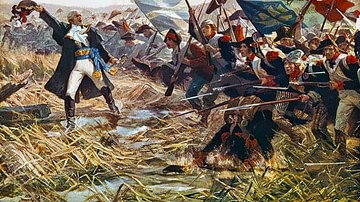Search
Search Results

Definition
Anne Boleyn
Anne Boleyn (c. 1501-1536) was the second wife of Henry VIII of England (r. 1509-1547). Anne, sometimes known as 'Anne of a Thousand Days' in reference to her short reign as queen, was accused of adultery and executed in the Tower of London...

Definition
Henry VII of England
Henry VII of England ruled as king from 1485 to 1509 CE. Henry, representing the Lancaster cause during the Wars of the Roses (1455-1487 CE), defeated and killed his predecessor the Yorkist king Richard III of England (r. 1483-1485 CE) at...

Definition
Mary I of England
Mary I of England reigned as queen from 1553 to 1558. The eldest daughter of Henry VIII of England (r. 1509-1547) with Catherine of Aragon (1485-1536), she restored Catholicism in England while her persecution of Protestants led to her nickname...

Definition
Richard III of England
Richard III of England ruled as king from 1483 to 1485 CE. Richard succeeded Edward V of England (r. Apr-Jun 1483 CE), the son of Edward IV of England (r. 1461-1470 CE & 1471-1483 CE) in mysterious circumstances. The young Edward V and his...

Definition
Monroe Doctrine - The Controversial Cornerstone of US Foreign Policy
The Monroe Doctrine, a significant piece of United States foreign policy, was first articulated by President James Monroe in 1823, and it essentially warns the powers of Europe from meddling in the affairs of the Western Hemisphere, claimed...

Collection
The Royal House of Stuart
The Stuart royal line (originally spelt Stewart) was founded in Scotland when Robert II took the throne in 1371. James VI of Scotland (in England known as James I) then unified the Scottish and English crowns following the death of Elizabeth...

Definition
Battle of Jemappes
The Battle of Jemappes was a decisive battle in the War of the First Coalition (1792-97), part of the French Revolutionary Wars (1792-1802). On 6 November 1792, a French army under General Charles-François Dumouriez defeated an Austrian force...

Image
The Royal House of Windsor in Britain - Rebranding the Crown - From Saxe-Coburg to Windsor
The House of Windsor represents the modern phase in the long dynastic evolution of the British monarchy, reflecting how royal identity adapted to political pressure, public opinion, and national crisis. By the late 19th and early 20th centuries...

Definition
John Locke
John Locke (1632-1704) was an English philosopher responsible for laying the foundation of the European Enlightenment. Locke believed that each branch of government should have separate powers, that liberty must be protected from state interference...

Definition
Montesquieu
Montesquieu (1689-1757) was a French philosopher whose ideas in works like The Spirit of the Laws helped launch the Enlightenment movement in Europe. His ideas on the separation of powers, that is, between the executive, legislative, and...